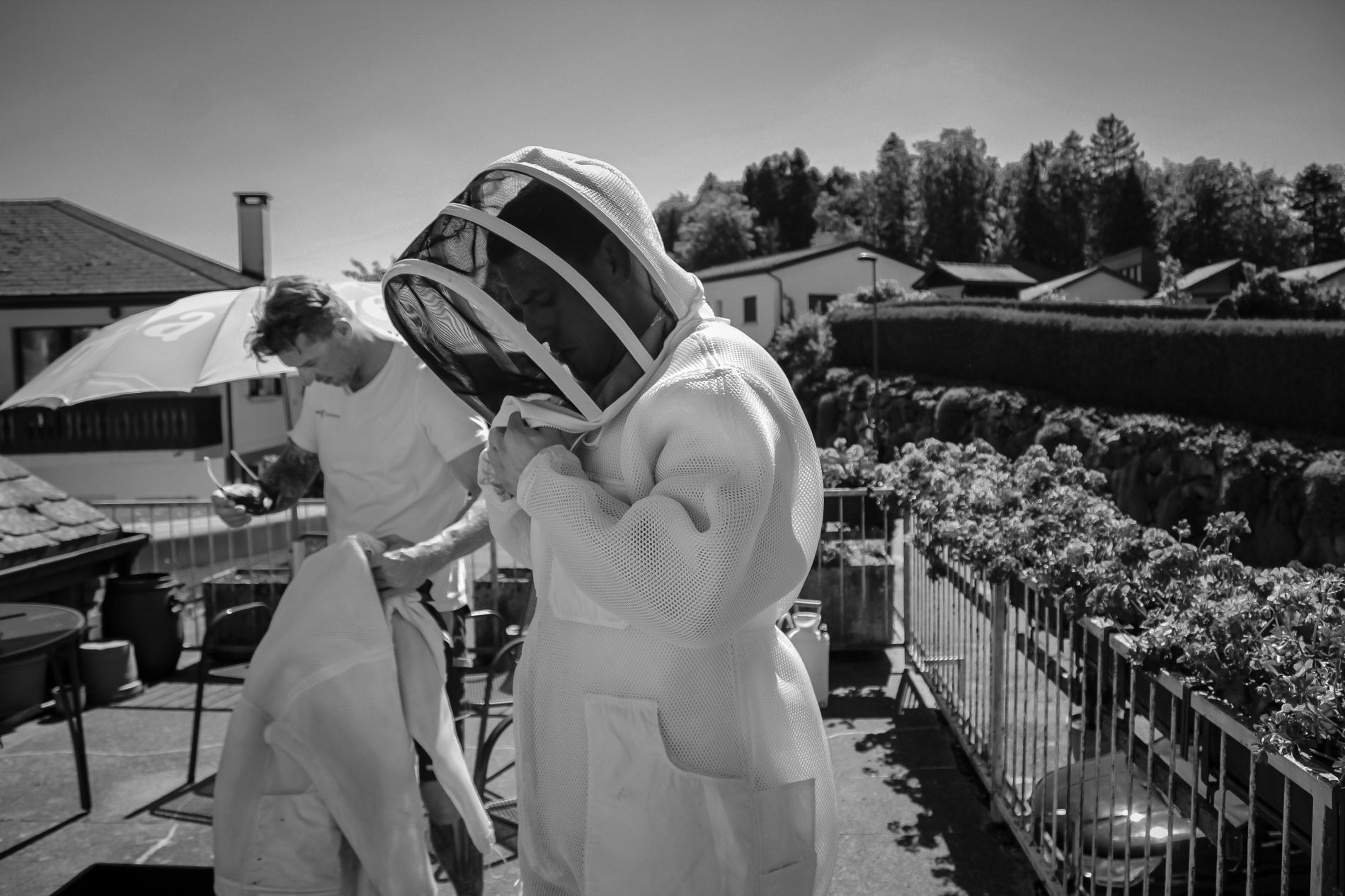
Fighting Asian hornets in Lenzburg
Have you discovered an Asian hornet's nest? We'll be on site quickly! Call now - Daily Mon-Sun 07:00-21:30. Contact us now: 058 510 22 54
Having the Asian hornet's nest removed
Vespa velutina, a hornet species from South-East Asia, has forcefully spread to Switzerland and beyond, causing concern among beekeepers due to its reputation as a hunter of honey bees. Although not dangerous to humans, just a handful of these hornets can swiftly attack and destroy a bee colony within a short time frame. If you have discovered a hornet's nest on your house, patio, shed, or in your blind box, contact our experts for hornet nest removal in Lenzburg!
Use the uncomplicated telephone service of the Hornet experts in Lenzburg and simply inform us at 058 510 22 54, we will be on site quickly so that you and everyone in your area feel completely safe again.
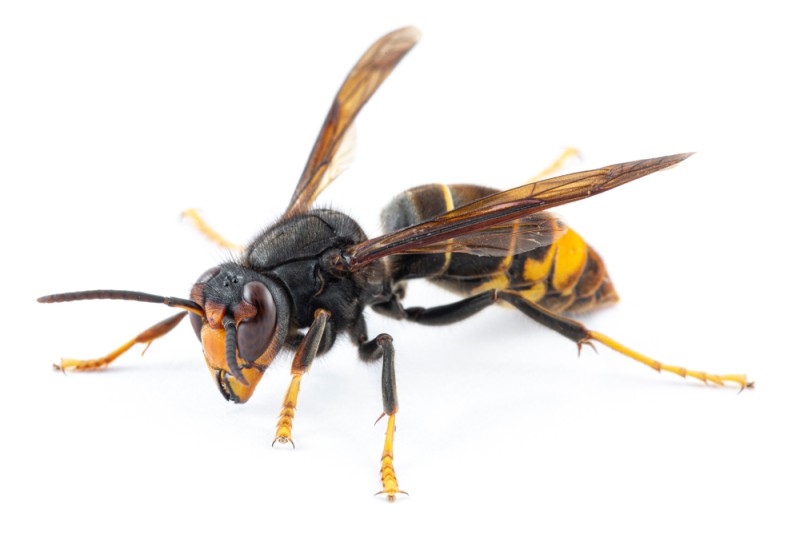

Appearance of the Asian hornet
Here are some characteristics that distinguish the Asian hornet:
1. Size: The queen can reach a length of about 3 cm, while the workers are slightly smaller and measure about 2.5 cm.
2. Color: The Asian hornet has a dark body that is almost black, with a yellow stripe at the back of the abdomen. Its face is orange-yellow.
3. Wings: The wings are dark and almost smoky gray.
4. Legs: The hornet has yellow tips on its legs, which is a striking distinguishing feature when it flies.
5. Nest: The Asian hornet's nest is often high in the trees, but it can also be found underground or in tall structures such as chimneys. It has an oval shape and is made of chewed wood, which gives the hornet a papery texture.
It is important to distinguish the Asian hornet from the European hornet (Vespa crabro), which is more harmless and a natural part of the European fauna. If you suspect you have found an Asian hornet nest near you in Lenzburg, you should report this to the local authorities, or using our reporting form, as they can spread quickly and be harmful to bees and other insects. To avoid being attacked by the flying inhabitants, you should hire a professional pest controller such as the Hornet Experts Lenzburg. We can identify the nest beyond doubt and take further steps to remove the Asian hornets professionally.
News about the Asian hornet in Lenzburg
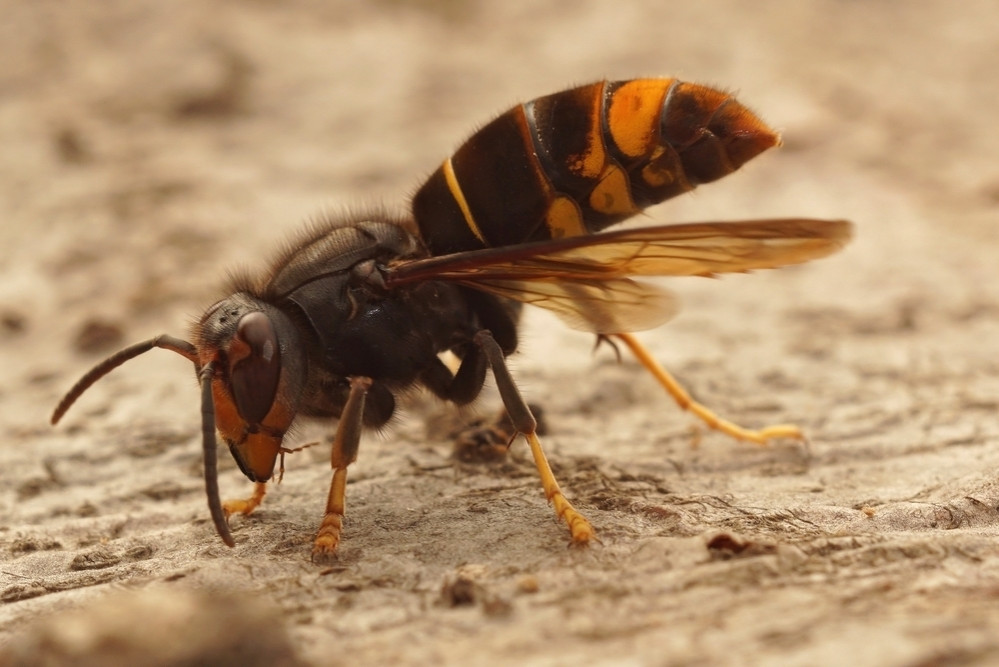
02.12.2025 Western Switzerland: Killer hornet eats bees
The territory of the Asian killer hornet has expanded considerably this year, with a notable increase reported in western Switzerland. This invasive species poses a significant threat to native bee populations, as bees make up the majority of its diet. The potential consequences are serious. Moreover, the hornet represents a danger to individuals with allergies to its venom.
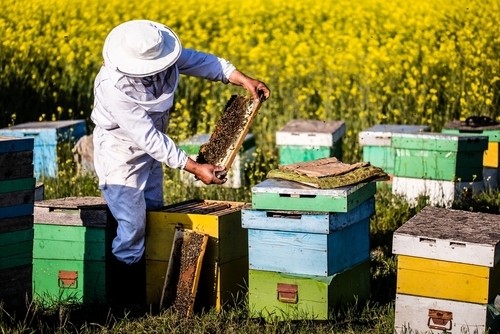
25.11.2025 Serious concerns about the bee population!
Asian hornets are inflicting significant harm on beehives across multiple parts of Europe, as reported by local beekeepers. Even a small number of hornets can destroy an entire bee colony within hours. This sharp decline in pollinators could have serious consequences for pollination, local ecosystems, and agricultural productivity.
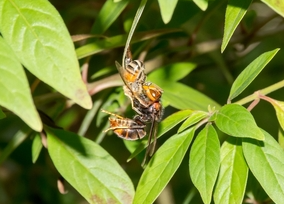
18.11.2025 Asian hornet doesn't just eat bees!
The danger it presents to insects is substantial!
The Asian hornet feeds largely on honeybees—up to 85 percent of its diet—alongside beetles and flies. This high level of predation not only poses difficulties for fruit growers but also further threatens already vulnerable bee populations.
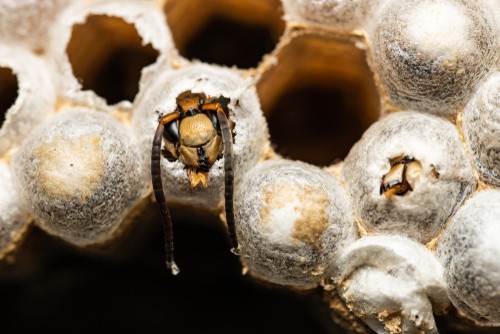
11.11.2025 How did the Asian hornet get to Europe?
The Asian hornet likely arrived in Europe unintentionally and has quickly expanded throughout France and nearby countries. Its adaptability to different environments and the absence of natural predators have contributed to its rapid spread. A single nest can generate several hundred new queens in one breeding season.
Asian Hornet Reporting Form
Please fill out all required fields and submit the form.
Help us!
If you discover an Asian hornet or a nest of this invasive species in Lenzburg, it is of the utmost importance that you report it immediately. The Asian hornet is not only dangerous to humans, but also poses a serious threat to native bee populations and the ecological balance in Switzerland.
Why is it important to report the find?
The establishment of the Asian hornet in certain regions has a notable influence on indigenous insect life, honey bees in particular. By preying on these bees, the Asian hornet can bring about a decrease in pollinator populations, with far-reaching effects on local flora and agricultural productivity. By reporting sightings, experts can react quickly, remove the hornets or their nests and thus prevent the spread of this invasive species.
Notification form for sightings
Our joint efforts to regulate the overpopulation of the Asian hornet in Switzerland and protect our native insect populations are crucial. We kindly request that you report any suspicions or sightings using our dedicated reporting form. With your support and timely intervention, we can mitigate the spread of this dangerous species and preserve the integrity of our ecosystems.
Your contribution is crucial in the fight against the Asian hornet in Lenzburg. Together we can protect nature and maintain the balance of our ecosystems;
Thank you for your vigilant attention and your commitment to protecting our environment.
How dangerous is the Asian hornet?
The Asian hornet (Vespa velutina) is a predatory insect that originated in Asia and has spread in recent years to various parts of Europe, including France and now also Switzerland and in Lenzburg. Although it poses a threat to honey bees and native biodiversity, it is generally no more dangerous to humans than other wasp species. Nevertheless, there are some aspects to be aware of:
1. Threat to honey bees: The Asian hornet preys on honey bees, threatening native bee populations. A decline in bees can have a negative impact on pollination and thus on local flora and agricultural production.
2. Stings: As with other wasp and hornet species, the stings of the Asian hornet can also be painful. For most people, the stings are unpleasant but not dangerous. However, people who are allergic to wasp or hornet stings can suffer a severe allergic reaction, which in the worst case can lead to anaphylactic shock.
3. Aggressiveness: Although the Asian hornet is not necessarily more aggressive towards humans than other wasp species, it can become aggressive if it feels threatened, especially near its nest.
4. Ecological effects: Apart from the direct effects on honey bees, the spread of the Asian hornet can also disturb the ecological balance by affecting the populations of other insects.
Recognizing the difference between the Asian hornet and the Asian giant hornet (*Vespa mandarinia*) is crucial. Known as the "killer hornet," the giant hornet is potentially more hazardous to humans due to its greater size and more potent venom.
If you have discovered a nest, call us immediately: 058 510 22 54
Our hornet professionals in Lenzburg are certified by the VSS.
Frequently Asked Questions About Asian Hornets in Lenzburg
The Asian hornet, distinguished for its capacity to inflict stings that carry significant and, in some cases, deadly consequences, stands as a highly dangerous insect that far exceeds the level of peril associated with other hornet species.
Spanning about 3 cm, the Asian hornet is a sizeable stinging insect recognized for its slim, black physique adorned with vibrant patterns of orange, yellow, and black stripes.
By nature, the Asian hornet appears shy and non-provocative. Nevertheless, it displays remarkable agility and aggressiveness when confronted or driven into a defensive position.
The Asian hornet's bite can cause significant harm to humans due to its toxicity, and it has the potential to provoke allergic reactions.
The Asian hornet's dangerous reputation is emboldened by its venomous sting that delivers more pain than other wasps and has the potential to elicit allergic reactions.
If you need to make a report regarding an Asian hornet, it is necessary to contact a regional officer who focuses on the protection of wild bees or the relevant department within the Ministry of Agriculture.
Taking prompt action and reporting Asian hornets is vital to prevent attacks and halt the insect's proliferation, considering its territorial and aggressive tendencies.
Professional hornet control is indispensable when facing Asian hornets in Switzerland. Calling upon a pest control service is highly recommended.
Regrettably, the Asian hornet is not protected, underlining the significance of closely monitoring their population to avoid their propagation.
As they hibernate, Asian hornets may gather together in clusters or choose to dwell alone, occupying the edges of walls, buildings, garden sheds, unused houses, or natural tree hollows.
Would you like more information about Asian hornets? Then take a look at our FAQ's about Asian hornets.
Private inquiry form
For an uncomplicated request to remove an Asian hornet's nest, please use our contact form for private individuals.
Real estate inquiry form
Use our property management order form to request the removal of an Asian hornet's nest.
Ecotox GmbH
Partner of: frelon-asiatique-suisse.ch & asiatische-hornisse.ch




_5.jpeg)
_5.jpeg)
_5.jpeg)
_5.jpeg)